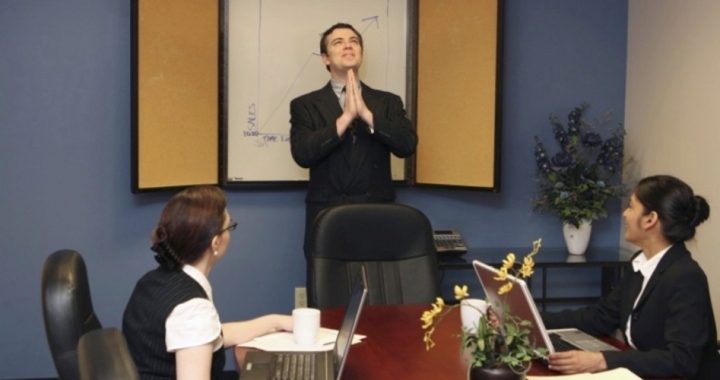
A federal appeals court has ruled that the prayers opening the monthly government meetings in Greece, New York, over the past 10 years have been too Christian. The U.S. Court of Appeals for the 2nd Circuit found that Greece’s policy of opening monthly meetings with an invocation violated the First Amendment’s supposed separation of church and state because the prayers have been almost exclusively offered by representatives of the Christian faith.
“The town’s desire to mark the solemnity of its proceedings with a prayer is understandable,” wrote Judge Guido Calabresi for the three-judge panel. “Americans have done just that for more than two hundred years. But when one creed dominates others — regardless of a town’s intentions — constitutional concerns come to the fore.”
From 1999 to 2007 every monthly government meeting in Greece was opened with a Christian invocation. But in 2007 two city residents, Susan Galloway and Linda Stephens, complained about the trend, prompting the town to invite a Wiccan priest, a Baha’i representative, and a Jewish man to offer the prayers. Nonetheless, at eight of the 12 meetings Christians offered the invocation.
In 2008, with the aid of the atheist group Americans United for the Separation of Church and State, the two disgruntled women sued the city and its supervisors, charging that the prayer policy violated the Constitution. Reuters News reported that a lower court “ruled in the town’s favor before a trial, finding that town employees did not intentionally exclude any particular faiths and did not restrict the content of the prayers.” But the three-judge 2nd Circuit panel unanimously reversed that decision on May 17, “finding that the town’s process for selecting speakers virtually ensured a Christian viewpoint.” Reuters reported. “Even though most of the congregations in Greece were Christian, the town could have invited clergy from outside its borders, the panel found.”
According to the Associated Press, each month an employee of Greece, a suburb of Rochester, used a local directory of churches to choose a minister or lay person to offer the prayer at the meeting. But that directory did not include non-Christian places of worship — because, locals attest, they aren’t aware that any exist in the community. “The court found that religious institutions in the town of just under 100,000 people are primarily Christian, and even Galloway and Stephens testified they knew of no non-Christian places of worship there,” reported the AP.
Thus, the court found, the policy ensured that only Christians would be chosen to pray. “The town’s process for selecting prayer-givers virtually ensured a Christian viewpoint,” wrote Judge Calabresi.
While the judges recognized that there was no formal policy on choosing who would offer the invocation, and the meetings were open to all faiths, “it also noted the town board didn’t publicize the idea that anybody could volunteer to deliver prayers and made no comment when a prayer in October 2007 described people who objected to the prayer practice as a ‘minority … ignorant of the history of our country,’ ” reported the AP.
Barry Lynn, executive director of Americans United, fairly exulted in the ruling. “We are very happy with the court’s decision,” Lynn observed. “Government meetings should welcome everyone. When one faith is preferred over others, that clearly leaves some people out.”
The group’s lawyer in the case, Ayesha Khan, added that “municipalities need to ensure that no single religion is advanced in their prayers, and they have to take a fairly active role in ensuring constitutional compliance.”
But attorney Joel Oster of the Alliance Defense Fund, which represented the city of Greece in the case, said that the ruling forces the city to become a prayer monitor in its meetings, and turns the reverent tradition of prayer into a government-supervised affirmative action program. He said that the city would appeal the decision.
“Since this nation’s founding, public meetings have been opened with prayers offered according to the conscience of the speaker,” noted Oster. “There is no legal reason why a town cannot engage in this practice today with people from within its own community. The district court rightly affirmed the constitutionality of the town’s policy.” He added that secular groups with a grudge against Christianity “cannot be allowed to force local governments to engage in strange hoops and hurdles that effectively eliminate prayers by making them too difficult to take place.”
Oster pointed out that the U.S. Constitution “has never required any local government to engage in such gymnastics to have prayer, as is clearly seen by the prayers of America’s Founding Fathers. Prayer-givers have a right protected by the First Amendment to engage in speech that reflects their own conscience and religion during such prayers. That does not make the prayers an endorsement by the town itself of any particular religion.”



